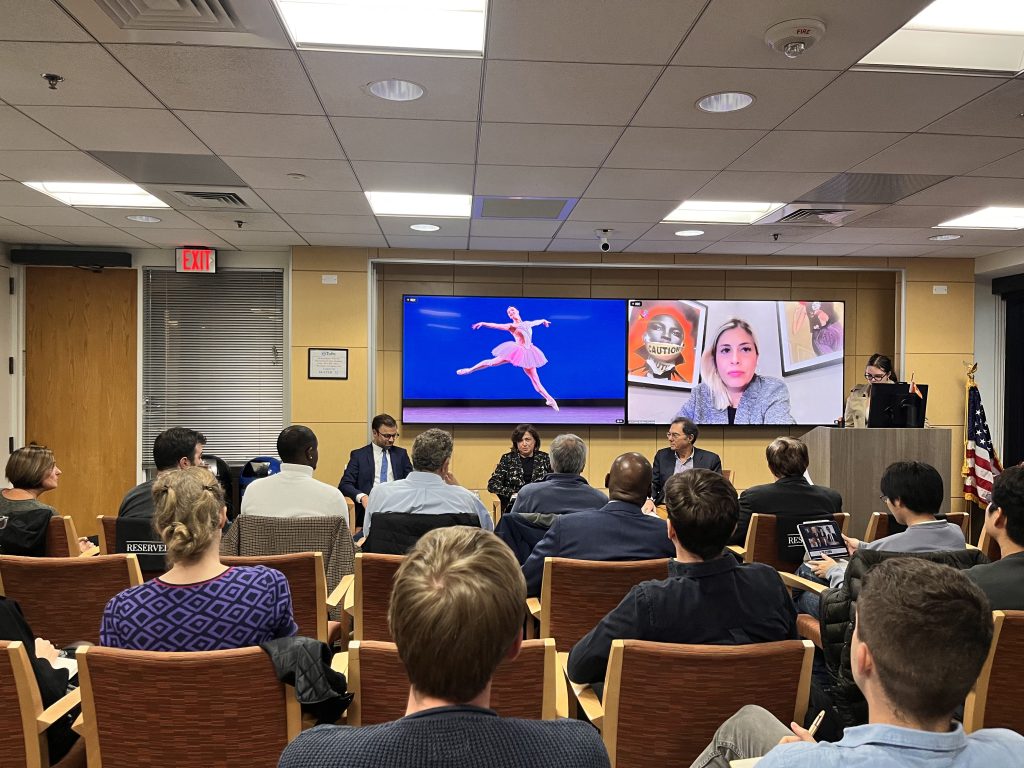
A Hard Look at Soft Power
A Hard Look at Soft Power
By: Ian Ullmann
On October 30th, the Fletcher School’s Edward R. Murrow Center for Global Diplomacy held its much anticipated Soft Power Summit. Moderated by Tara Sonenshine, Edward R. Murrow Professor of Practice at the Fletcher School, the conversation featured Hendrik Ohnesorge (University of Bonn) and Michael F. Oppenheimer (New York University) in person, as well as virtual guests Carla Canales (U.S. State Department, Arts Envoy), Nicholas Cull (University of Southern California), Farah Pandith (Harvard Kennedy School), and Jacob Ware (Council on Foreign Relations). In addition, a pre-recorded interview was recorded with Joseph Nye, the former Assistant Secretary of Defense and University Distinguished Service Professor Emeritus, at the Harvard Kennedy School. The conversation, which ran close to 90 minutes, defined soft power and explored its application in the 21st Century. Looking closely at climate change, international politics, and terrorism, the speakers presented diverse perspectives that addressed soft power’s overall effectiveness as a tool of foreign policy.
As Nye put it, soft power is “the ability to get what you want through attraction, not coercion.” Even realist scholars, he advised, should consider all forms of power, as “soft power can be more effective when used with hard power.” The other panelists echoed Nye with the consensus that soft power is rooted in a state’s attractiveness. Cull argued that soft power sometimes becomes a “beauty contest” where unattractiveness can have a negative effect on a state’s reputation. He referenced three U.S. presidents who successfully took on flashy, progressive policy steps to combat the negativity surrounding their respective administrations: John F. Kennedy (civil rights), Lyndon B. Johnson (immigration reform), and Jimmy Carter (human rights).
While every panelist agreed on attractiveness as the basis of soft power, Ohnesorge noted that attraction is ultimately in “the eye of the beholder.” Illustrating this idea, Ware pointed to election denialism in the United States, ostensibly repulsive to a democratic state but desirable to someone like former Brazilian president Jair Bolsonaro, who took inspiration from Donald Trump’s unfounded claims of voter fraud and refusal to concede defeat. A great power such as the United States will always gain overseas admirers, no matter how much its reputation has changed. Whatever happens in the United States, good or bad, will be attractive to someone, somewhere else.
Oppenheimer, who called the United States a “dysfunctional superpower,” offered a grim analysis on American soft power, arguing that “we are at a major inflection point of how others perceive us.” Citing the inability to pass major legislation, formulate and execute coherent foreign policy, and grow an equitable economy, Oppenheimer claimed that the United States is building a reputation of incompetence, a reputation that persists even among nations that simultaneously consume substantial amounts of American culture. Pandith, who served in the Obama Administration, responded optimistically, highlighting innovation as a means to transcend negativity in the United States, insisting that there are “great things we can convey to the world.” Canales shared this optimism, citing the Global Music Diplomacy Initiative, a recent Department of State initiative that exists due to successful bipartisan legislation.
The summit ended with discussion on who should lead public diplomacy: government or the people. When both parties are needed to make a state attractive, it gets complicated when the United States cannot decide who it wants to be or which values it wants to promote. Overcoming these divisions conveys a message of resilience that would be irresistibly attractive to the rest of the world. Until the American people take the first steps in restoring our image, the government can only do so much.
(Photo credit to Christine Marsh.)

Ian Ullmann is a first-year MALD student focusing on International Security and International Negotiation and Conflict Resolution. Prior to Fletcher, Ian taught 6th grade history and English at Cincinnati Public Schools, where he was placed as a Teach For America corps member. He graduated from Bard College with a joint degree in history and political science.